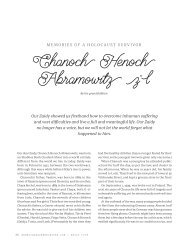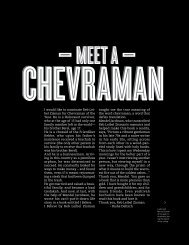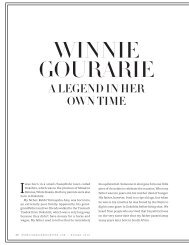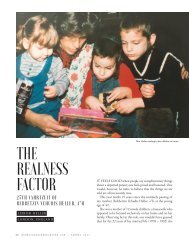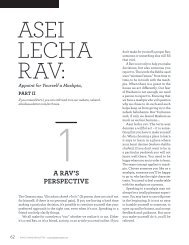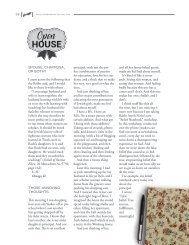EE Nissan 16
Create successful ePaper yourself
Turn your PDF publications into a flip-book with our unique Google optimized e-Paper software.
APRIL 20<strong>16</strong><br />
29<br />
->BETW<strong>EE</strong>N<br />
FRIENDS<br />
withESTHER<br />
EtiQuette<br />
Dear Esther,<br />
At a wedding I bumped into my sister’s friend. In middle<br />
of our conversation she said, “Congratulations for<br />
your sister! Aren’t you proud?” I had no idea what I was<br />
supposed to be proud of. My sister’s friend clued me in<br />
that my sister had landed a big promotion at her job.<br />
Apparently it was a big deal, but somehow my sister<br />
“forgot” to tell me her big news. I am hurt that my sister<br />
kept this from me and I’m also wondering why. This<br />
was a significant change in her life and we have spoken<br />
a number of times since she was promoted, so it wasn’t<br />
an accident. After I was made aware of the news I asked<br />
her, “How’s the job going?” and she responded with a<br />
vague “Baruch Hashem.” What am I to make of this?<br />
Signed,<br />
A Shut-out Sister<br />
Dear Sister,<br />
You’ve got me thinking about the nature of secrets and<br />
why people keep them, even among family. Your sister<br />
was withholding information from you. Let’s figure<br />
out why.<br />
Why do we mislead people or avoid their questions<br />
(as your sister did with her evasive “Baruch Hashem”),<br />
sometimes even lying outright, to hide a truth from<br />
someone else?<br />
People keep secrets for one of two reasons: 1. To<br />
protect themselves or 2. To protect someone else.<br />
Since it is not our place to divulge the details of<br />
someone else’s life, it is always noble to keep another<br />
person’s secret.<br />
But let’s discuss our own secrets that we keep to protect<br />
ourselves. It is true that we need to protect ourselves<br />
from the prying eyes and blabbing mouths of the greater<br />
world. We cannot trust just anybody with our private<br />
information. But when that mistrust extends even to<br />
our own family, that is sad. Who better to share our triumphs<br />
and woes with than our siblings? If we cannot be<br />
certain that our siblings would bear our burdens without<br />
judgment and celebrate our joys wholeheartedly, then we<br />
need to examine those relationships. Because you can’t<br />
be close with people you don’t trust.<br />
Sharing demands vulnerability. Vulnerability demands<br />
safety. For people to be open with one another, they<br />
must feel safe with one another; safe from judgments<br />
and competition. Ideally, a family, especially the large<br />
and loving families that we are familiar with, should be<br />
a safe space for its members. Each sibling should instinctively<br />
know that the others love them unconditionally,<br />
will protect them at all costs and do not view them as<br />
competitors. Sounds easy, right? As most of us know,<br />
it’s not. Unfortunately there are many families where the<br />
siblings compete with each other to be “the most important”<br />
or “the most successful” and that creates fissures in<br />
the relationships. If we are competitors, we cannot truly<br />
be happy for each other’s successes, because the success<br />
of each member is always viewed in the context of his<br />
or her siblings. If we are more successful, we may fear<br />
sharing our success, knowing how it might be received<br />
by our siblings. On the flip side, we also cannot share<br />
our troubles, as that would tarnish the image of success<br />
and competency we are working so hard to keep up. So,<br />
we spend our lives keeping up images to the only people<br />
with whom we should be able to let our guards down.<br />
Because we don’t really feel safe with them.<br />
Your sister must be one of those people who is wary<br />
of her own siblings.<br />
She may be worried you will receive her happy news<br />
with jealousy; she may be the type of person who receives<br />
other people’s happy news with jealousy and assumes<br />
others do the same.
30 NSHEICHABADNEWSLETTER.COM<br />
Don’t make this about you and the fact<br />
that she didn’t share with you. Show her<br />
how genuinely happy you are for her.<br />
Regardless of the reasoning, you have options. Though<br />
much of our attitude toward our siblings depends on<br />
the family dynamic with which we were raised, there<br />
is much that you, as a self-aware and mature adult,<br />
can do. Start by picking up the phone and telling your<br />
sister, in a friendly and open way, that you heard about<br />
her promotion and you want her to know that you are<br />
happy for her and proud of her. Don’t make this about<br />
you and the fact that she didn’t share with you. Show<br />
her how genuinely happy you are for her and how you<br />
do not view her success in the context of your success<br />
and failures. Even if you have to work through layers<br />
and years of mistrust, keep up this behavior with your<br />
siblings. Hopefully, this will rub off on your entire family<br />
and help you become a happier, stronger unit. And even<br />
if it doesn’t rub off on your siblings, this behavior will<br />
rub off on your children. It is certainly within your<br />
power to create an environment for your own family<br />
where everyone feels safe enough to be vulnerable, and<br />
ensure that your children become, and remain, a close,<br />
loving and mutually supportive unit.<br />
Signed,<br />
Esther<br />
Dear Esther,<br />
I am in middle of trying to marry off my daughter and<br />
going through the lists of references on prospective boys’<br />
profiles. Recently, I had an experience that left me feeling<br />
queasy. My husband and I were finding out about<br />
a young man named Chaim and called the person who<br />
was listed as his mashpia to find out about him. We<br />
introduced ourselves and said we would like to ask him<br />
about Chaim. The mashpia said, “Look, I know you, so<br />
I’ll tell you the truth. He’s a nice boy, but honestly, you<br />
could get better for your daughter. He’s really nothing<br />
special and the father is an extremely difficult man who<br />
can’t get along with his own children.” I am appalled<br />
that a mashpia had no problem betraying confidences<br />
like this. I feel so sorry for the young man who trusted<br />
his mashpia with confidential family issues and that is<br />
now being used against him. I think references need to<br />
be taught what their job IS and what it is NOT. Thank<br />
you in advance, Esther.<br />
Signed,<br />
A Kind Inquisitor<br />
Dear Kind,<br />
There are two issues here. One is the behavior of a reference.<br />
And the second is the behavior of a mashpia.<br />
First, I will take you up on your suggestion and give<br />
a little “Reference 101” crash course.<br />
As someone’s reference, your duty is to present him<br />
in the most favorable light. He has trusted you to be his<br />
advocate in the shidduch process and your loyalty needs<br />
to lie with him. That means answering questions truthfully<br />
but with a positive spin, the way you would answer<br />
questions about yourself in a job interview. Accentuate<br />
the positive qualities and steer the questioner in those<br />
directions. It is not your place to make the caller aware<br />
of any issues that he or she does not know. If you find<br />
you are unable to protect the person you are a reference<br />
for, ask to be taken off the list. You could say that you<br />
never know the right thing to say and fear you aren’t the<br />
best person for the job. Trust me, you’ll be crossed off<br />
faster than you can say “L’chaim.”<br />
If you feel the person in question is withholding serious<br />
and important information (such as his own illness),<br />
then address that person about it directly. Perhaps he was<br />
directed by a Rav to bring it up only once dating begins.<br />
What happened in the case you describe is much<br />
worse than just a reference doing the wrong thing. It is<br />
a mashpia abusing his position of power to hurt someone<br />
whom he is meant to help. One can only hope that<br />
most mashpias understand the seriousness of that and<br />
are respectful and discreet with the information they<br />
are privy to.<br />
Tip to profile-writing parents: Before putting someone<br />
down as a reference, ask them if they are up to the<br />
task. This might inspire loyalty.<br />
Signed,<br />
Esther




